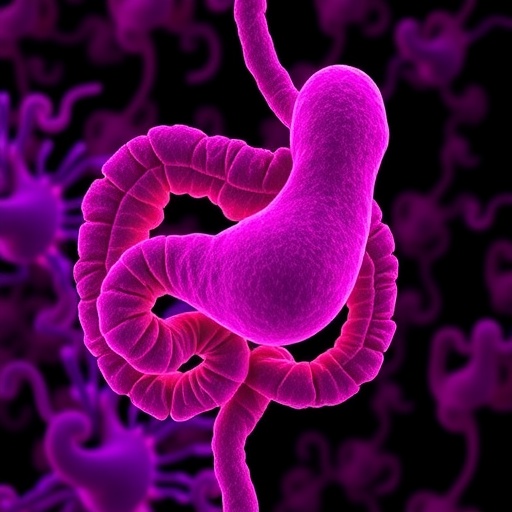Recent research has unveiled groundbreaking insights into the relationship between maternal gut microbiota and placental endocrine function. In a sophisticated study conducted by Lopez-Tello and colleagues, the intricate dynamics of how specific gut bacteria influence placental hormone production was explored using germ-free mouse models. This revelation has far-reaching implications for our understanding of maternal-fetal interactions and the potential impact of diet and microbiota on pregnancy outcomes.
The study primarily focused on the genus Bifidobacterium, which is a prevalent member of the human gut microbiome. Previous research has established that the gut microbiome plays a vital role in regulating immunological and metabolic functions. This latest investigation suggests that the benefits of Bifidobacterium extend beyond maternal health, directly affecting placental hormone synthesis, which is crucial for fetal development.
The researchers utilized germ-free mice to ensure that the variable of gut microbiota was controlled. This form of study is essential for understanding specific associations, as it eliminates confounding factors that might arise from the presence of a full microbiome. By manipulating the presence of Bifidobacterium in these mice, the team sought to observe changes in placental endocrine activity, particularly concerning hormones such as progesterone and cortisol, which are pivotal during pregnancy.
Their findings revealed a significant increase in hormonal production in mice that were supplemented with Bifidobacterium compared to those that were not. This contrasted sharply with the existing understanding of placental function. Traditionally, the placenta was viewed primarily as a passive organ, merely facilitating the exchange of nutrients and waste between mother and fetus. However, the discovery that maternal gut bacteria can actively modulate hormonal output suggests that the placenta is much more dynamic than previously believed.
The implications of this research extend to potential therapeutic applications. Understanding how gut microbiota influence placental function opens the door to novel strategies for improving pregnancy outcomes through dietary interventions. If certain strains of bacteria can enhance hormonal production beneficially, this could lead to dietary recommendations for expectant mothers, particularly those at risk of pregnancy complications.
Additionally, the findings push the envelope on the concept of microbial programming. Just as genetic predispositions and maternal lifestyle choices are known to impact fetal development, it seems that the gut microbiome occupies a critical axis in this developmental orchestra. The idea that bacterial colonies could influence endocrine pathways absolves a simplistic view of nutrition, suggesting that the symbiosis between host and microbiome plays a crucial part in health.
The study also raised pertinent questions about the timing and quantity of Bifidobacterium. Would the timing of introduction affect hormonal responses? Would higher doses lead to varying outcomes? These questions highlight the complexities of microbiota interactions and warrant further investigation. It is essential not only to decipher which strains exert these effects but also to understand the mechanisms behind these interactions.
Moreover, the long-term implications of these findings cannot be understated. If placenta-related hormone levels can be modulated through dietary means, this could lead to lasting changes in mother and offspring health profiles. The potential to reduce risks associated with gestational diabetes or preeclampsia through targeted nutritional strategies presents an exciting frontier in maternal and fetal health.
In parallel, the research underscores the need for multidisciplinary approaches in understanding human health. Collaboration between microbiologists, obstetricians, and nutritionists will be crucial as we expand our comprehension of the gut-brain-microbiome axis in maternal health. The convergence of these fields could yield comprehensive guidelines for prenatal care and interventions, transforming the landscape of maternal-fetal medicine.
Furthermore, the ethical considerations of such findings cannot be ignored. While the potential benefits of modulating gut microbial communities are exciting, there is an inherent responsibility to ensure that any dietary recommendations are safe and effective for diverse populations. The variability in gut microbiota among individuals can lead to different outcomes, emphasizing the need for personalized approaches in care and nutrition.
In conclusion, the study by Lopez-Tello and colleagues marks a pivotal moment in our understanding of the interplay between gut microbiota and placental function. The significant impact of maternal Bifidobacterium on hormone production provides a fresh perspective on maternal health. As research in this domain progresses, we stand on the brink of potentially revolutionizing prenatal care, guided by the principles of nutritional microbiome therapy. The journey from bench to bedside will be crucial as we look to translate these findings into practice, ensuring healthier pregnancies and improved outcomes for future generations.
Exploring these dynamics offers a glimpse into a complex web of interactions within the maternal environment, reminding us that health is not merely a consequence of genetics and immediate lifestyle choices. Instead, it is a multifaceted construct influenced by the unseen world of microorganisms. As we delve deeper into this research, the prospect of harnessing the power of the gut microbiome in promoting health becomes ever more tangible.
The findings reinforce the idea that our bodies are not isolated systems but rather part of an intricate network that includes various microorganisms. By embracing this holistic viewpoint, we can better understand the foundations of health and develop innovative strategies that leverage the benefits of microbial interactions. Ensuring a healthy maternal gut microbiota may very well be a cornerstone of achieving optimal pregnancy outcomes.
Subject of Research: Maternal gut microbiota influence on placental endocrine function in germ-free mice.
Article Title: Placental endocrine function is controlled by maternal gut Bifidobacterium in germ-free mice.
Article References: Lopez-Tello, J., Kiu, R., Schofield, Z. et al. Placental endocrine function is controlled by maternal gut Bifidobacterium in germ-free mice. J Transl Med 23, 1031 (2025). https://doi.org/10.1186/s12967-025-07198-4
Image Credits: AI Generated
DOI: 10.1186/s12967-025-07198-4
Keywords: Gut microbiota, placental function, maternal health, Bifidobacterium, endocrine regulation, pregnancy outcomes.




